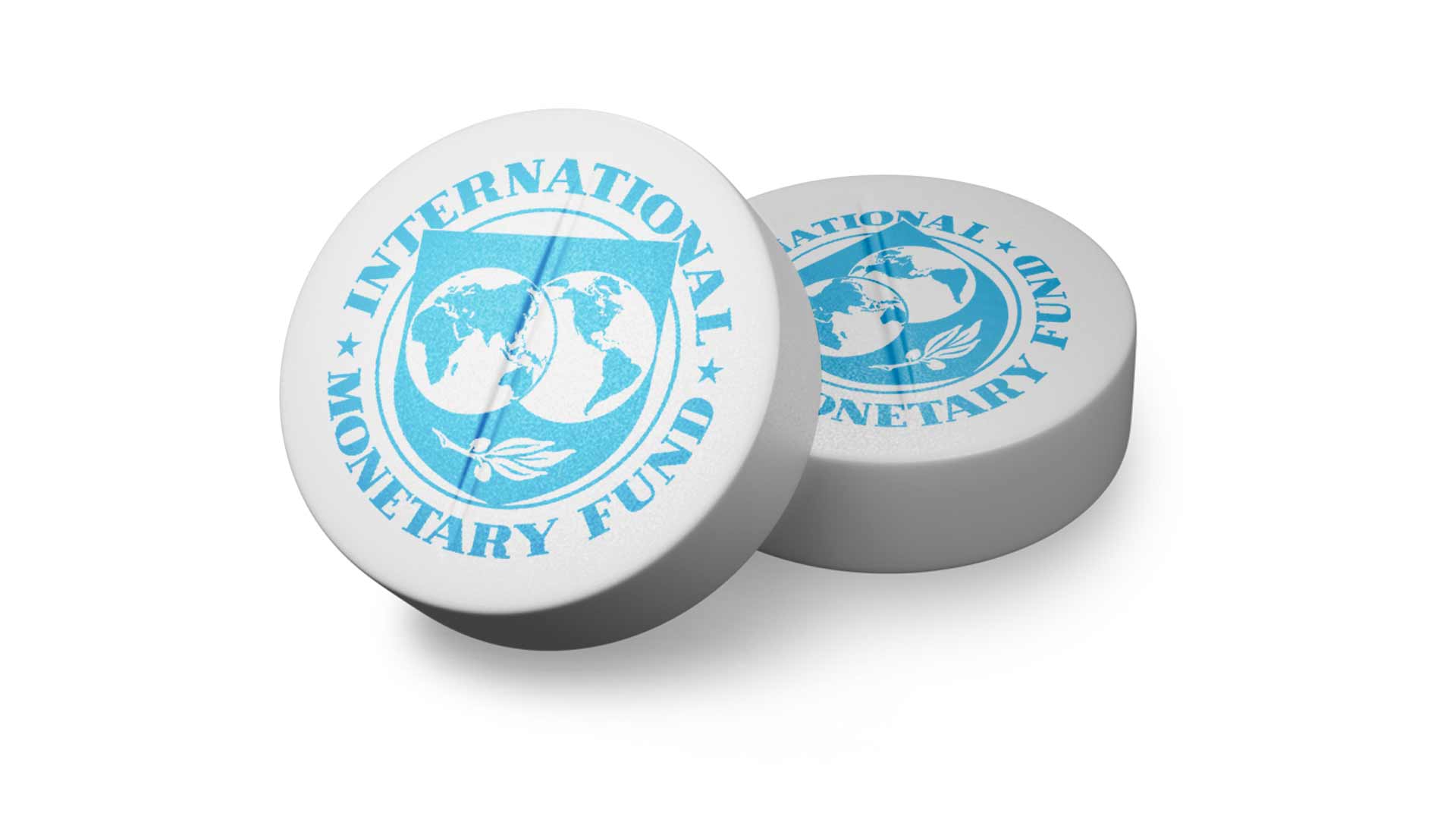On Thursday 7 April, most Lebanese were surprised to learn that the International Monetary Fund (IMF) had concluded a “staff-level agreement” with the government for a long-awaited financial aid package. According to the IMF’s press release, the agreement contemplates delivering a total of SDR 2,173.9 million (approximately US$3 billion) over a 46-month period.
The development attracted praise from international bodies like the European Union – not to mention a host of Lebanese politicians. Yet, in practice, the agreement seems like a band-aid applied to an arterial wound, unlikely to ease the Lebanese public’s cascading economic woes. Instead, the IMF risks offering a veneer of competence and legitimacy to Lebanon’s venal sectarian leaders – the same political class that is scheduled to contest parliamentary elections in just over one month, on Sunday 15 May.
No deal at all
On paper, the IMF statement does present a logical, five-pillar strategy for Lebanon’s financial recovery. The plan revolves around financial sector restructuring, debt sustainability, stronger governance, reform of state assets, and transparency in both monetary and exchange rate systems. The staff-level agreement also contemplates a very generally phrased protection for ‘small’ depositors, auditing of the entire banking sector, and reforming (not removing) Lebanon’s archaic banking secrecy regime. But the deal’s scale, timing, and lack of specificity keeps the bargain within the orbit of the factors that cast the country into the current economic morass. On available evidence, the proposal does not chart a bold new path.
Importantly, a staff-level agreement does not impose any binding commitment on the IMF, or its member states, to deliver financial assistance. While very much required, the $3 billion deal is a pittance compared to the estimated $70 billion hole in the financial system, or the close to $100 billion of deposits subject to an illegal, multiple exchange rate policy. Ostensibly, further support will come upon completion of stern conditions and “confirmation of international partners’ financial support.”
That last statement is a clear signal to myriad international players with interests in Lebanon that the IMF will not be going this alone. We should not forget that, right before the last parliamentary elections in 2018, Lebanon’s political class were offered $11 billion (CEDRE) to enact reforms that pale in comparison to what’s being asked today. Under the broad five-pillar strategy, the IMF is asking for Lebanon’s notoriously reform-averse political and banking class to enact satisfactory bank and debt restructuring strategies; comprehensively audit Lebanon’s largest 14 banks and the Banque du Liban’s (BDL) foreign assets; lift banking secrecy laws; and unify the country’s official and black-market exchange rates.
The reforms, while admirable, seem unrealistic firstly because they target political elites’ decades-long financial dominance. For instance, the BDL has resisted an independent audit since mid-2020 with no real consequences. Similarly, commercial banks have closely guarded their individual financial positions, refusing to admit their institutions’ insolvency. Politico-banking elites fear true exposure of the banking sector’s losses. This is because, at present, depositors are angrily filing lawsuits both inside Lebanon and elsewhere, insisting that decision-makers assume greater financial responsibility for their actions.
The same considerations apply to the requirement of bringing Lebanon’s banking secrecy laws “into line with international standards.” The proposed reforms would ideally help to fight corruption, facilitate the banking sector’s restructuring and regulation, improve tax administration, and support investigation and prosecution of financial crimes. In December 2020, the Parliament lifted these protections only on the BDL’s accounts. International auditor Alvarez and Marsal subsequently faced stubborn resistance to reviewing BDL’s accounts, including lack of payment for their auditing services. The Alvarez and Marsal audit remains incomplete.
History suggests that Lebanon’s political-banking class will continue resisting comprehensive banking secrecy reforms. Since the 1960s, the same elites have thrived from sweeping confidentiality guarantees over Lebanese bank accounts, which have facilitated widespread theft, corruption, and money laundering. Moreover, the IMF would do well to consider the depth of financial ties between Lebanon’s politicians and bankers. As last measured in 2016, political figures have established links to 18 out of Lebanon’s 20 largest banks.
Seriousness requires specifics
Aside from the more aspirational reform proposals laid out by the IMF, perhaps the more important point is what aspects the so-called deal does not cover. The IMF’s statement suffers from overly vague terms, and a lack of transparency about their true nature. The Lebanese public has no clarity over what would constitute an acceptable bank restructuring strategy, aside from the IMF’s yet-to-be defined assertion that it must protect ‘small depositors and limiting recourse to public funds.’ Any bank-by-bank restructuring would require a combination of debt write offs, bail-ins, and consolidation. That means banks founded on sectarianism and patronage systems will have to accept mergers with other sects and patronage networks – threatening a prized element of sectarian financing.
The IMF statement also fails to specify critical details about how the banking losses will be distributed, the definition of whose ‘small’ deposits will be protected, and how that protection would operate. Given the IMF’s insistence that banking secrecy be brought into line with international standards, the fact they did not insist on the international standard that shareholders are to be wiped out under the (most likely) scenario of a bail-in is a glaring admission that the substantive details of this deal have not been agreed by any party.
Lack of specificity also applies to the deal’s proposed broadening of Lebanon’s tax base and strengthening revenue intake – with the potential that new taxes may operate regressively (thus falling on the poor) instead of progressively. Indeed, the statement only says that state revenues should be ‘more equal and transparent.’ It then cites the need to pass the 2022 budget because the draft contains ‘a change in imports valuation for custom and tax purposes to be done at a unified exchange rate.’ For the unacquainted, the measure ostensibly translates into support for the current illegal multiple exchange rate policy, not to mention the added inflationary effects of effectively increasing customs tax in an economy which is 80% import dependent.
Beyond vague references to ‘modernizing the central bank legal framework and governance and accountability arrangements,’ accountability features only in the IMF’s analysis of what Lebanon is currently suffering from. This reflects the IMF’s self-perception as nothing more than a technocratic institution which supports its member states — no matter how corrupt, undemocratic, criminal, or culpable they are in the suffering of their respective peoples.
Accountability matters
Lebanese should not forget that the IMF also needs a public relations win. The IMF treads much more carefully than it did during the years of structural adjustment programmes and austerity hammered economies across the globe. For years, the IMF has been trying to change its image in the world. IMF management talk of gender, climate change, and poverty sometimes more than they do of macro-economic reform, while seeking to rebrand austerity as “fiscal consolidation.” Having offered Argentina its 22nd bailout loan last month, the IMF will be wary of the reputational and financial risks that Lebanon poses.
To prove that the IMF’s statement on a financial rescue plan for Lebanon is more than a vaguely worded public relations stunt which props up Lebanon’s unaccountable ruling class, the IMF must provide more details about its targets and indicators of success over the initial 46-month funding period. In Lebanon’s context – where the economic crisis and bankruptcy of the state can be clearly pinned to ruling class self-interest – the IMF faces a moral duty to avoid vagaries. Instead, the IMF must provide details to ensure its funding does not legitimate the rule of a kleptocracy.
To start, the IMF must take a clear stance on how its programme will instill accountability. If the solution to the financial crisis is one where those who created the problem don’t pay their fair share, then it’s no solution at all. In a country where war criminals run government and an explosion can destroy half the city without consequences for those responsible, the IMF should not be adding to the fuel to the fire of impunity. What it should do instead is come clean on its position around the banks’ distribution of losses, and not leave that vital debate to be sorted out a la Libanaise. That’s because there’s a big difference between protecting deposits up to $50,000 and those up to $250,000—a difference which comes out of the pockets and portfolios of the bankers who caused the crisis.
Next, no IMF deal comes all at once—much less the co-funding from other entities. Should accountably be a hallmark of a future IMF programme, the public will need to know how many milestones and what reform measures need to be put in place, and when. It will not be enough for the IMF to merely monitor the figures reported by a government that doesn’t even collect its GDP numbers. The IMF will need to station technical staff inside ministries and the BDL to make sure the government does what it says it will. What’s more, the current capital control law making its way through Parliament seeks to absolve the banking sector of its crimes for the past 2.5 years—it should have been vehemently opposed by the IMF. If the bill passes in its current form, it will mean the IMF cares more about covering for Lebanon’s establishment than any real reform of the system.
Three pillars of recovery
On debt relief, everyone knows that banks will have to write off their LBP-denominated debt, but Lebanon will need help to negotiate with the international vulture capital firms to which local banks sold their foreign currency debt (aka Eurobonds). The IMF will be key to those negotiations, and should seek to combine a bail-in with a wipe-out of local bank’s shareholders. This approach would instil greater accountability for how the banks sold out Lebanon’s long term financial stability at a discounted rate. Making sure debt holders, not least the IMF, are paid back will also need to be linked to incentives and sustainable growth, so as not to repeat the post-2008 austerity policies which still hamstring many economies. Should the banks not wish to merge under a restructuring plan, the BDL will need to force their hand, finally declaring them bankrupt and prosecuting their shareholders.
Fiscal space cannot be built off the backs of those who have suffered most during the financial crisis. For the moment, privatisation is out of the question given the dire condition of state assets; while laying off hundreds of thousands of public sector workers will only create an even deeper poverty hole to crawl out of. Furthermore, there should be no increase of indirect taxes, such as VAT or excise duties. Instead, combining the lifting of banking secrecy, with greater progressive tax collection in line with levels in OECD countries would go much further towards reducing inequality and making Lebanon financially sustainable.
Such moves would garner public support, which the IMF will need as the pain of any reform programme takes hold. To bolster that support, the IMF will also need to reverse its ostensible endorsement of a special exchange rate on customs dollars and clarify a clear position against illegal multiple rates. In doing so, the IMF should take a clear stance on a managed float of the Lebanese Lira, governed by public-interest central bank policy meeting international regulatory standards, where bodies regulated by oversight bodies are not headed by those they are supposed to regulate. Stress-tests to monitor the health of the financial system need to be legislated and monitored by the IMF, while power over central bank decision making needs to be dispersed outside of governors and vice governors of the BDL.
The IMF should make no mistake, at every step of the way, Lebanon’s political class, its banks, and the BDL will seek to duck and dodge every substantive reform plan or programme for their own narrow sectarian and financial interests. Yet the IMF should not forget that it occupies a powerful position, being the only lifeline available for Lebanon’s government to establish some legitimacy after decades of financial mismanagement. This first major announcement by the IMF was rushed, lacked substance, and ultimately proved to be a boon for Lebanon’s establishment. In future, the IMF would do well to focus on rescuing Lebanon’s people rather than its political and banking class.



